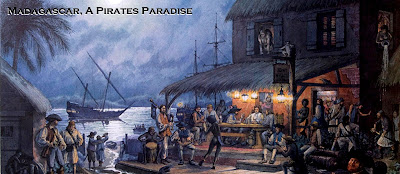Among Tales told by seafarers in the 17th century were of the strange colony located on the coast of Madagascar - where a brotherhood of Pirates had founded a community, one based on democratic values that lived in peace and harmony - Libertalia lasted for twenty years.
These pirates who settled in Libertalia would be 'vigilant Guardians of the People's Rights and Liberties' and they would stand as 'barriers against the Rich and Powerful' of their day. By waging war on behalf of the Oppressed against the Oppressors, they would see that 'Justice was equally distributed'. These sort of radical ideas were very common in various Pirate-Era celebrations - after the American Revolution, Pirates fleeing from England who got stranded on an island actually started their own Libertatia community. They called their new island 'The Republic of Spensonia', after the fictional Utopian Country created by the English author and Political Reformer Thomas Spence.
In spite of their penchant for looting and treasure hunting, pirates were indeed anti-capitalist, they openly opposed to the dispossession that necessarily accompanied the historic ascent of Wage Labor and Capitalism. They insisted that every Man was born free, and had as much Right to what would support him, as to the Air he respired. They resented the encroachments by which Villains (a.k.a. the ruling Classes) and Unmerciful Creditors grew immensely rich as others became poor and wretchedly miserable. They spoke of the 'Natural Right to a Share of the Earth as is necessary for our Support'. The act of Piracy was viewed as a war of self-preservation which looked to redefine the fundamental relations of Property and Power. They had no need for money where every thing was in common, and no hedge bounded any particular man's property, and decreed that the Treasure and Chattels they became owners of through Piracy should be divided equally among their Brothers and Sisters.
Libertalia's motto was 'For God And Liberty' - and its flag was white (in contrast to the black of the Jolly Roger). They were perceived as anarchists by the powers that be, waging war against states and lawmakers, attacking their ships, sparing prisoners, and freeing slaves. They called themselves Liberi, and lived under a communal city rule, a sort of worker owned corporation of Piracy. They had articles (shared codes of conduct), and used elected systems of re-callable delegates.
Judging Pirates by the Imperialist wet Dream that governs our History, not to mention Hollywoods influence - it all seems too fantastic in comparison with what we are told about pirates, that is probably because the historical sources about Libertalia originate in a single book called 'A General History of the Robberies and Murders of the Most Notorious Pirates' by Captain Charles Johnson, published in 1726; and whilst there is controversy surrounding that particular tome, with speculation that Captain Johnson was in fact the pen name of the famous writer Daniel Defoe (Author of Robinson Crusoe) that has never been confirmed, and the Stories of Libertalia persist.
It is the general claim of many modern scholars that Libertalia (or Libertatia) was not actually a real place, but rather like Shangri-La or Atlantis - and is based in a bunch of half truths shrouded in its own Mythology. Journalist Kevin Rushby toured the area seeking descendants of pirate inhabitants but declined to search the jungles for Libertalia - noting 'others have tried and failed many times' - which says to me that he either believed it not to be real in the first place, or maybe he did think it real but didn't want to find Truths that could shatter modern preconceptions of Pirates and what our Lives COULD be like.
There were pirate settlements on and around Madagascar, on which Libertalia may have been based: Abraham Samuel at Port Dauphin, Adam Baldridge at Ile Ste.-Marie, and James Plaintain at Ranter Bay were all ex-pirates who founded trading posts and towns. These locations appear frequently in official accounts and letters from the period, while Libertalia appears only in Johnson’s General History, Volume 2.
Johnson writes about the overall set up of Libertalia - the settlement was proposed to have an elevated fort on each side of the harbor with 40 guns in each fort, from the Portuguese. Below the fort, under the protection of the forts, was where the living quarters along with the rest of the town was located. Libertalia was located roughly 13 miles east-south-east of the nearest of the nearest civilization. However, the overall location has been deemed to be completely fictional - but without a more stringent examination of what is fact and what is myth we cannot discern fact from fiction at this time (and it needs to be done because of a desire to find the truth, without any agenda beyond that).
The quest for Libertalia The Pirate Utopia Continues . . .












No comments:
Post a Comment